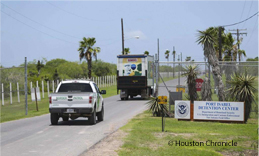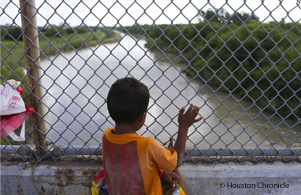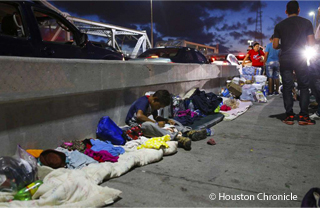Lawyers arrive in the early morning hours at the Port Isabel Detention Center in an attempt to meet with detained parents from Central America who fled their homes in fear of their lives in hopes of life and safety in the U.S.
The lawyers, who normally represent large corporations in commercial litigation and regulatory matters, are not immigration experts, but they have been provided expedited training so they can advise detainees on their rights regarding asylum.

Late in the afternoon, those same lawyers exit the two-story red brick building into the overwhelming heat and humidity physically and psychologically exhausted.
During the nine hours they were inside, each lawyer met with a half-dozen Honduran and Salvadoran mothers and fathers – their ages ranged from 23 to 41.
The detainees begged the lawyers for help, for information about their children. Most had not heard from their daughters or sons for days or weeks and had no idea where they were or if they were safe.
The lawyers say the few dozen detainees they met were overcome with fear and anxiety and were emotionally desperate. Most of them were not sleeping or eating well. Many are sick. Some were still dehydrated from the 1,100-mile journey from Honduras to Reynosa, Mexico, where they crossed the Rio Grande River into the U.S. near McAllen.
Swatting away mosquitos and wiping away the sweat outside the sprawling 375-acre PIDC facility, which is surrounded by high fences with double layers of razor wire, the corporate attorneys struggled to recount the stories that they were just told.
“The details of what these mothers and fathers have endured is horrifying,” says Philip Shapiro, a lawyer at Gibson, Dunn & Crutcher, who spent the past week meeting with a dozen detainees. “From what I could tell, their fear is real and credible. If they return home, they believe they and their children will die or be tortured.

“No one should have to experience what these fathers and mothers and their children have been through, and, unfortunately, are still going through,” he says.
Shapiro and others describe the stories the detainees are telling as nothing short of “harrowing.”
Many were repeatedly gang-raped by gangs or family members with associations to gangs. Some were beaten because they could not afford to pay a gang-imposed tax. Others were tortured or had family members kidnapped because they witnessed a crime. Several were brutally sexually assaulted, forced into prostitution with their daughters or forced to become domestic slaves because … well … they are young women living where they were born and the police do nothing to protect them or their children.
The Texas Lawbook interviewed in person and on the telephone seven corporate lawyers who have worked pro bono for detainees at Port Isabel, Karnes Family Detention Center in Karnes City and the South Texas Family Residential Center in Dilley.
Most of the lawyers spoke on the condition that they not be identified because they do not have permission from their law firm’s leaders to be quoted publicly or worried about retribution against their clients by federal immigration officials.
Several major corporate law firms – including Akin Gump, Bracewell, Cooley, Haynes and Boone, Paul Weiss and Ropes & Gray – have sent or are sending lawyers and support staff to the border to advise detainees, which now number in the thousands.
These lawyers are working with immigration rights groups, including the Human Rights Initiative, Refugee and Immigrant Center for Education and Legal Services, the Tahirih Justice Center, Kids in Need of a Defense and the South Texas Pro Bono Asylum Representation Project.
“We are dealing with people who truly have no resources,” says Bracewell partner Richard Danysh, who is working with women at the INS facility in Dilley. “These women left everything they own and know behind and took their children out of incredibly horrible situations in order to save their lives.
“I am appalled at a policy that tries to deter and punish people by separating them from their children,” Danysh says. “It is inhumane, and it is not right.”
The goal, according to the lawyers, is to talk with the detainees before immigration agents, who are known as “asylum officers,” conduct the initial “credible fear interview.”

Lawyers say the credible fear interview occurs anywhere from a few days to a couple weeks after the detainees have been arrested. It is the first critical point in the process in determining whether they can stay a little while longer to pursue asylum or be deported almost immediately.
The problem, according to the lawyers, is that the parents often do poorly in the interview because they are not prepared or simply do not understand what is needed of them.
“These women are so overcome with fear and anxiety – they have not had enough sleep and they are not eating well and they are incredibly worried about their children,” says Josh Rosario, a white-collar defense lawyer with Gibson Dunn who worked the past week at the Karnes Detention Center.
“They don’t understand the questions and they don’t know to tell the asylum officers exactly what they’ve experienced back home and the fear that they face,” Rosario says. “Everyone I interviewed was certain that they or their children will be abused, raped or killed if they are sent back.”

Rosario said he interviewed a mother this past week of a 23-month-old who suffered severe abuse at the hands of a Guatemalan criminal organization. Her initial interview didn’t go well because she primarily speaks Achi, a Mayan language, and a little Spanish. The credible fear interview was conducted in Spanish and the woman didn’t understand much of what was being asked.
He also advised a Honduran mother who brought her seven-year-old daughter to the U.S. after she witnessed her sister being sexually abused. The mother moved her family across the country to an uncle’s house, but she was followed and raped by two men.
All seven lawyers agree that the testimony of the women they have interviewed are heartbreaking and should be enough for them to be granted asylum.
They also say that the stories the mothers and fathers tell of federal agents separating them from their children is also disturbing.
“Mami, Por qué dejas que me lastimen?” a mother told one of the lawyers.
“Mi hijo de nueve años me suplicó. Él lloró y lloró. No me dejes ir,” a father told another attorney.
Most of the lawyers say they have spoken with detainees who have been presented with a proposal by U.S. agents before the mothers and fathers met with legal counsel: agree to the deportation order, waive their rights to a hearing with an immigration judge and they will be reunited with their children as quickly as possible.
“Parents are for the most part feeling coerced into giving up their claims for asylum or other immigration relief with the expectation that that is the fastest and easiest way to be reunified with their children,” RAICES Director Manoj Govindaiah told the Houston Chronicle in an interview.
Editor’s Note: This week, The Texas Lawbook will feature articles about corporate lawyers doing pro bono work for detainees at the border. If you are a lawyer who is involved in this work, The Lawbook would love to hear your story.
